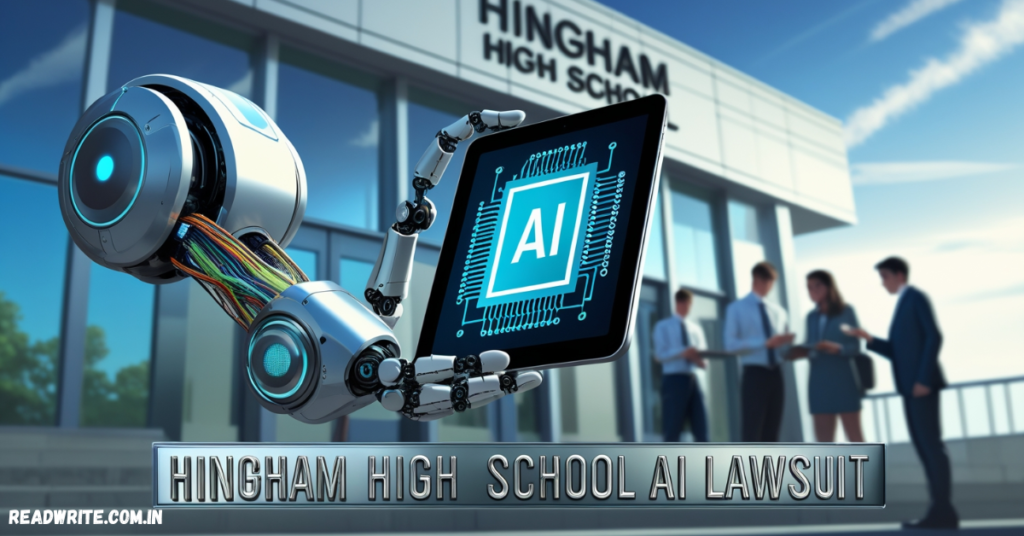The world of education is no stranger to controversy, but the recent lawsuit involving Hingham High School and artificial intelligence (AI) has stirred significant debate. As schools increasingly integrate AI into their systems, issues related to privacy, fairness, and ethical use are coming to the forefront. This blog delves into the details of the Hingham High School AI lawsuit, its potential implications for educational institutions, and the broader discussion around AI in schools.
What Sparked the Lawsuit?
The lawsuit involving Hingham High School centers on the school’s alleged use of AI-powered surveillance tools to monitor students. According to the plaintiffs, these tools infringed on student privacy and violated legal protections. The controversy began when several students and parents noticed the use of advanced software to analyze online activities, flagging behaviors deemed inappropriate or suspicious.
The core of the lawsuit is the claim that these AI tools collected data without adequate consent, raising questions about transparency and the boundaries of acceptable surveillance. Critics argue that the school’s approach breached privacy laws and exposed students to unwarranted scrutiny.
The Role of AI in Education
AI has rapidly become a valuable tool in education, helping teachers manage workloads, providing personalized learning experiences, and even detecting potential safety threats. However, its use must be balanced with ethical considerations. In the case of Hingham High School, the AI systems used reportedly included:
- Monitoring software that tracked students’ online activities.
- Facial recognition tools to identify students in school premises.
- Predictive analytics aimed at identifying potential behavioral issues.
While these tools offer significant benefits, such as enhancing safety and improving educational outcomes, they also pose risks, including the potential for misuse, bias, and violations of privacy.
Legal and Ethical Issues
The Hingham High School AI lawsuit brings to light several legal and ethical concerns:
1. Privacy Violations
The primary legal contention is whether the school violated privacy laws by collecting and analyzing student data without proper consent. Under federal laws such as the Family Educational Rights and Privacy Act (FERPA), schools must safeguard student information. If Hingham High School failed to meet these standards, it could face serious repercussions.
2. Lack of Transparency
Transparency is critical when implementing AI systems. Critics of Hingham High allege that the school did not inform students or parents adequately about the scope and nature of the AI tools being used, creating a trust deficit.
3. Algorithmic Bias
Another concern is the potential for AI systems to exhibit bias. If the algorithms disproportionately flagged certain groups of students, this could exacerbate existing inequalities and lead to unfair treatment.
4. Ethical Considerations
Beyond legalities, the ethical use of AI in schools is a pressing issue. Should schools prioritize safety at the cost of student autonomy? Striking the right balance between security and individual rights is a challenge that educational institutions must address.
Broader Implications for Schools
The Hingham High School AI lawsuit is not an isolated incident. It highlights a growing tension between the promise of AI and the need for robust governance frameworks. Schools across the nation are watching this case closely, as its outcome could set important precedents.
1. Policy Development
One potential outcome of the lawsuit could be the development of clearer policies regarding AI use in schools. These policies would need to address consent, data protection, and accountability.
2. Increased Oversight
Educational institutions may face increased scrutiny from regulatory bodies to ensure compliance with privacy and data protection laws.
3. Community Involvement
To rebuild trust, schools might need to involve students, parents, and educators in discussions about AI implementation, fostering greater transparency and collaboration.
Steps Toward Responsible AI Use
For schools to harness the benefits of AI while avoiding pitfalls, several steps are essential:
1. Conduct Impact Assessments
Before deploying AI systems, schools should conduct thorough impact assessments to evaluate potential risks and benefits.
2. Ensure Transparency
Clear communication about how AI tools will be used, what data will be collected, and how it will be protected is vital.
3. Implement Strong Data Protection Measures
Schools must prioritize data security, ensuring that student information is stored securely and used only for legitimate purposes.
4. Address Bias in AI Systems
Regular audits of AI algorithms can help identify and mitigate biases, promoting fairness and equity.
5. Provide Training and Education
Educators and administrators should be trained to understand AI technologies and their implications, empowering them to make informed decisions.
Conclusion
The Hingham High School AI lawsuit underscores the importance of responsible AI use in education. While AI offers tremendous potential to enhance learning and safety, its implementation must be guided by ethical principles, legal compliance, and a commitment to transparency. As the case unfolds, it will likely shape the future of AI in schools, influencing how educational institutions nationwide approach this powerful technology. For now, the focus must remain on finding a balance between innovation and the fundamental rights of students and families.

